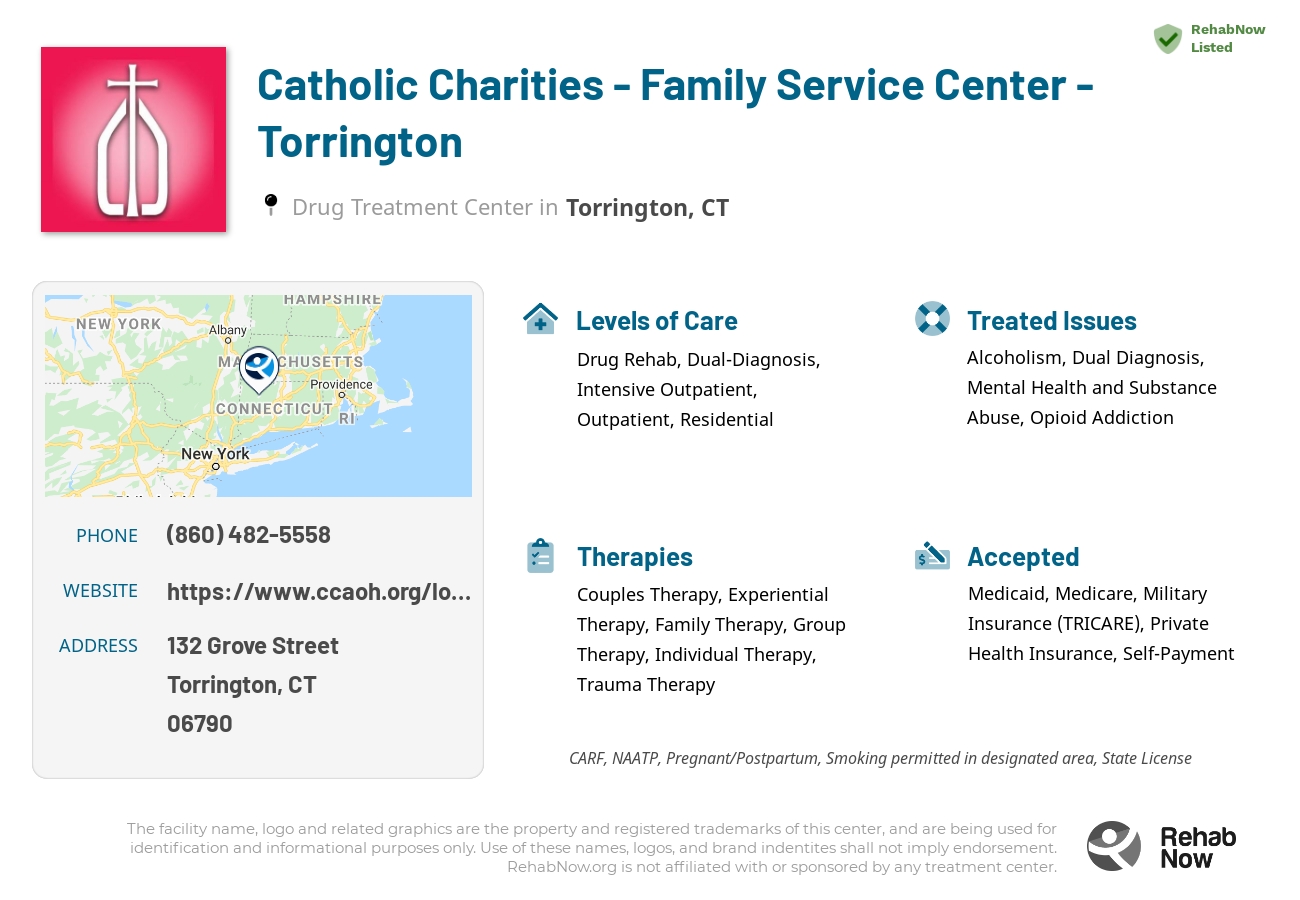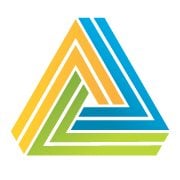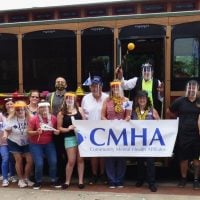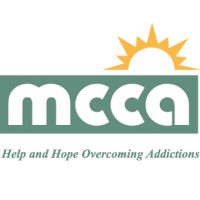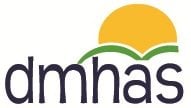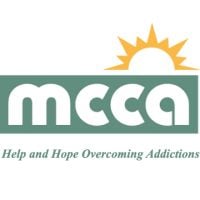Catholic Charities - Family Service Center - Torrington
Drug Rehab Center in Torrington, Connecticut
Catholic Charities - Family Service Center - Torrington is a nonprofit organization in Torrington, Connecticut that provides a range of community services, including addiction and substance abuse counseling and treatment.
About Catholic Charities - Family Service Center - Torrington in Connecticut
Catholic Charities - Family Service Center - Torrington is a substance abuse and mental health treatment facility located in Torrington, Connecticut. This center offers a range of services for individuals seeking recovery from addiction and substance abuse. They provide a safe and supportive environment for those struggling with alcoholism, dual diagnosis, opioid addiction, drug addiction, and substance abuse issues. The facility accepts private health insurance, making their services accessible to a wide range of individuals in need of treatment.
Catholic Charities - Family Service Center - Torrington offers various treatment options to address addiction and mental health concerns. Their services include drug rehabilitation, dual-diagnosis treatment, and intensive outpatient programs. They provide both residential and outpatient levels of care, allowing individuals to choose the treatment option that best suits their needs. The center also provides aftercare support to help individuals maintain their sobriety and transition back into their daily lives. With their affiliation with Catholic Charities - Connecticut, this facility combines evidence-based treatment methods with a compassionate and holistic approach to help individuals overcome their addiction and find lasting recovery.
Genders
Ages
Modality
Additional
Conditions and Issues Treated
Opioid addiction starts when a person becomes addicted to legal or illegal opioids. The addiction can happen quickly, in just a matter of days. Opioid withdrawal can be extremely uncomfortable and lead the user to continue to use even if they want to quit. Stopping using an opioid requires medical observation. Sometimes inpatient treatment with a medically supervised detox is necessary for managing the withdrawal process while learning lasting tools for maintaining recovery. Medications may be used in some cases of opioid addiction.
Opioid addiction is one of Connecticut‘s most prominent forms of addiction. It’s treated by detoxifying the body so that the chemicals from the medications no longer impact them and by therapies to correct behavior and target the root of the problem.
Recovery is not simply about stopping drug use. Recovery is working with addiction while recovering mental health issues that are fueling the addiction in the first place.
Levels of Care Offered
This center offers a variety of custom treatment tailored to individual recovery. Currently available are Drug Rehab, Dual-Diagnosis, Intensive Outpatient, Outpatient, Residential, with additional therapies available as listed below.
Addicts who need help with their addiction can enroll in an intensive outpatient program (IOP). But the patient won’t live there during treatment.
IOP involves patients visiting a medical office building regularly for therapy and other services while continuing to live their lives.
IOP is a step up from drug or alcohol detox, but it’s still a phase of recovery, not the end goal. Patients in need of IOP have many options for rehab and treatment.
Outpatient treatment is considered the lower intensity level of addiction treatment. It’s ideal for early phase addiction or lower intensity addictions. It may include weekly sessions instead of daily. It may include weekly sessions instead of daily. Peer group support, 12-step programs, and individual counseling may still be involved but at a lesser frequency than an intensive outpatient program. It is a good choice for someone who doesn’t need to go through a medically supervised detox and who has a supportive home environment. It requires motivation and dedication to commit to the program without constant monitoring.
Residential treatment programs are those that offer housing and meals in addition to substance abuse treatment. Rehab facilities that offer residential treatment allow patients to focus solely on recovery, in an environment totally separate from their lives. Some rehab centers specialize in short-term residential treatment (a few days to a week or two), while others solely provide treatment on a long-term basis (several weeks to months). Some offer both, and tailor treatment to the patient’s individual requirements.
Therapies & Programs
Individual therapy involves one-on-one sessions between the patient and therapist. It provides patients with a safe environment to openly discuss personal and sensitive issues with the therapist. They find the therapist as someone they can trust. Individual therapy aims to identify the core issues that would have led the patient to substance abuse and address them effectively. The therapist can develop patient-specific customized solutions through individual therapy, which aids speedier recovery.
Couples therapy works with clients and significant others in a professional capacity to improve relationship dynamics. This can be helpful for addicts who are trying to marry the idea of recovery into their work, family, social lives – any aspect that has to do with relationships.
Through counseling sessions, addicts will have an opportunity to talk about their addiction with professional partners. These partners can offer feedback and advice on how to get sober while keeping healthy relationships intact. A good couples therapist will help addicts understand their part in an unhealthy relationship dynamic or find ways to deal with anger or resentment from significant others outside of the home.
Family therapy is a group problem-solving that aims to improve communication and relationships between the addict, their family, and sometimes friends. The main goal of family therapy for drug addiction is to create an environment where communication can occur without judgment, hostility, or blame. The therapist is with the family as they learn to communicate differently, especially with the addict when s/he is using. The family can learn to reduce their enabling behavior or rally together and support each other during tough times.
An addict’s family can play a vital part in helping them to avoid relapse because they can spot the warning signs and help them get back on track before it becomes too much of a problem. Family therapy is one of the most effective ways to help addicts stay on the path to long-term sobriety. When a drug addict decides that they want to try and get sober, it takes the support of every person they love to succeed. It can be incredibly difficult for loved ones to watch an addict go through the pain and suffering of withdrawal, but by being there with them and supporting them, they can help to make sure that the addiction never returns.
Groups typically involve meetings with other recovering addicts who can relate to one another’s experiences. They might meet in person or online and typically focus on the process of staying sober rather than overcoming a specific addiction.
In these groups managed by Catholic Charities - Family Service Center - Torrington, addicts can build a sense of community and develop strong emotional connections with others who understand what they are going through. These beneficial relationships can help addicts overcome their cravings and prevent relapse at any point during the recovery process.
In general, trauma therapy is a clinical process that helps individuals deal with mental stress often caused by traumatic events. The therapist helps the person identify, understand, and work through the problem. This is done with the help of talking about it in group or one-on-one counseling sessions. Therapists use relaxation, role-playing, art, and music to help the person open up about what is bothering them.
There are many different types of trauma therapists, such as psychiatric nurses and counselors. Not everyone is a good candidate for this type of therapy; it is generally reserved for people who have recently experienced a traumatic event and struggle to get over it. It is often done for children, teenage victims of sexual assault, and war veterans.
There is hope for people who are addicted to drugs and alcohol. Cognitive Behavioral Therapy (CBT) is the solution. CBT focuses on the underlying thoughts and behaviors that caused the addiction problem in the first place and may cause a relapse. This type of psychotherapy addresses negative feelings common in substance abuse disorders. It helps to change them by restructuring thought patterns. It’s about removing negative thoughts and providing long-term benefits while promoting self-awareness, self-control, and healthy ways to respond to negative thoughts. These sessions can be done by themselves or as part of combination therapy.
Patient Experience
Experiential Therapy at Catholic Charities - Family Service Center - Torrington
Experiential Therapy teaches people how to think differently about their lives and change their emotions by changing their behavior. This type of treatment is accomplished with various activities that may involve acting, props, arts and crafts, animal care, or other tools that may be effective.
This therapy aims for patients to release suppressed thoughts that cause bad feelings and drug addiction. Role-playing, arts and crafts, music, animal care, rock climbing, etc., are some of the activities used in this therapy. Gradually an individual will feel calmer and more loving which will change their perception positively. In addition to treating drug addiction, experiential therapy is beneficial for different behavioral and eating disorders.
Payment Options Accepted
For specific insurance or payment methods please contact us.
Is your insurance accepted?
Ask an expert, call (888) 674-0062
Catholic Charities – Connecticut Associated Centers
Discover treatment facilities under the same provider.
- Catholic Charities - Family Service Center in New Haven, CT
- Catholic Charities - El Centro de Desarrollo y Reafirmacion Familiar in Hartford, CT
- Catholic Charities - Family Service Center - Church Street in Waterbury, CT
- Catholic Charities - Family Service Center - Milford in Milford, CT
- Catholic Charities - Institute for the Hispanic Family in Hartford, CT
Learn More About Catholic Charities – Connecticut Centers
Additional Details
Specifics, location, and helpful extra information.
Torrington, Connecticut 6790 Phone Number(860) 482-5558 Meta DetailsUpdated November 25, 2023
Staff Verified
Catholic Charities - Family Service Center - Torrington Patient Reviews
There are no reviews yet. Be the first one to write one.
Torrington, Connecticut Addiction Information
Connecticut has a higher rate of substance abuse and addiction than the national average. The state ranks in the top 10 in the country for illicit drug dependence among those ages 18 to 25. In 2010, there were 9,211 people admitted to an alcohol treatment facility for alcohol abuse combined with a secondary drug. Connecticut ranked fifth in the United States of America for the number of fatalities involving drunk driving in 2014.
About 8% of Torrington residents reported using illicit drugs in the past month. Most commonly abused drugs in Torrington include marijuana, cocaine, heroin, and prescription opioids. The abuse of these substances often leads to addictions and substance use disorders. Drug rehab centers can provide the necessary treatment and support to help individuals struggling with addiction get sober.
Treatment in Nearby Cities
- Schenectady, CT (81.2 mi.)
- Torrington, CT (0.6 mi.)
- Bethel, CT (33.9 mi.)
- Plainfield, CT (62.8 mi.)
- Enfield, CT (32.5 mi.)
Centers near Catholic Charities - Family Service Center - Torrington
The facility name, logo and brand are the property and registered trademarks of Catholic Charities - Family Service Center - Torrington, and are being used for identification and informational purposes only. Use of these names, logos and brands shall not imply endorsement. RehabNow.org is not affiliated with or sponsored by Catholic Charities - Family Service Center - Torrington.


